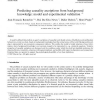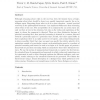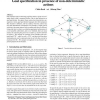115 search results - page 22 / 23 » Preferences of Agents in Defeasible Logic |
ENC
2005
IEEE
13 years 11 months ago
2005
IEEE
Following the argumentation framework and semantics proposed by Dung, we are interested in the problem of deciding which set of acceptable arguments support the decision making in...
ECAI
2006
Springer
13 years 9 months ago
2006
Springer
A model is defined that predicts an agent's ascriptions of causality (and related notions of facilitation and justification) between two events in a chain, based on background...
IJAR
2008
13 years 5 months ago
2008
A model is defined that predicts an agent's ascriptions of causality (and related notions of facilitation and justification) between two events in a chain, based on backgroun...
AI
2007
Springer
13 years 5 months ago
2007
Springer
Although reasoning about what is the case has been the historic focus of logic, reasoning about what should be done is an equally important capacity for an intelligent agent. Reas...
ECAI
2004
Springer
13 years 9 months ago
2004
Springer
One important aspect in directing cognitive robots or agents is to formally specify what is expected of them. This is often referred to as goal specification. For agents whose act...



